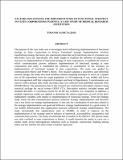Factors Influencing the Implementation of Functional Strategy in State Corporations in Kenya: A Case Study of Medical Research Institution
Abstract
The purpose of this case study was to investigate factor influencing implementation of functional strategy in State Corporation in Kenya. Functional strategy implementation involves transforming strategy decisions into operational plans that each functional area of a business can effectively carry out. Specifically, this study sought to establish the influence of organization structure on implementation of functional strategy at state corporations, it establish the extent to which communication process influence implementation of functional strategy at state corporations and lastly it established the influence of coordination of the activities on implementation of functional strategy at state corporations. The study was guided by communication theory and Weber’s theory. This research adopted a descriptive and inferential research design: the study also used stratified random sampling technique to arrive at a sample size of 80 respondents from the target population of 101comparing of top, middle and lower level management staff that comprised of mangers and head of departments. A questionnaire was used to collect primary data while secondary data was collected from published materials from KEMRI library. The quantitative data in this research was analyzed by descriptive statistics using statistical package for social science (SPSS V21). Descriptive statistics included means and standard deviation. A correlation matrix for all the key variables was computed. In addition, a multiple regression model was applied to determine the relative importance of each of the three independent variables with respect to implementation of functional strategy. From the findings study found out that communication process influence strategy implementation and therefore was a key factor on strategy implementation. It also rate the coordination of activities related to the strategy implementation was good and influence strategy implementation to a great extent. It was further demonstrated that organization structure influenced strategy implementation. The study recommends that organizations such as KEMRI, in order to improve on the implementation of the strategy need to enhance of teamwork, accountability, transparency and communication process. The study recommends that in tandem to be effective. The present study was only confined to state corporations in Kenya. It would however be useful to carry out a similar study across heterogeneous industries such as hospital, construction, banking among others and see whether the same results would be replicated.
Publisher
Africa Nazarene University

